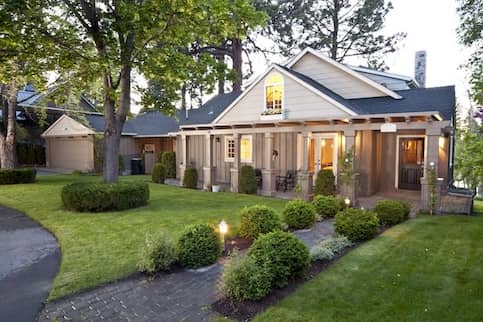Buying a home is more than a big financial commitment – it’s also emotional. If you don’t love or at least like your home, the time and money you put into buying it may not feel worth it. It’s also not always easy to know if a home is right for you. Sometimes, you’ll know the moment you see it, but it often takes time and careful consideration to make a good decision.
Here are some tips to help you decide if a home is the right for you to buy.
Key Takeaways:
- Buying a home is a big deal, so you want to ensure you buy a home you’re happy to live in.
- Make a list of your wants, needs and must-haves, and make sure you know how much you can afford before you start shopping.
- Take your time to consider each property carefully, but also be ready to act quickly to avoid losing out to another offer.
How To Choose A Home That’s Right For You In 11 Steps
Before you start shopping for a home, think carefully about what you’re looking for. That can help guide you toward the right home for your needs. Follow these steps to help you avoid buyer’s remorse.
1. Understand How Much House You Can Afford
Buying a home you can afford helps you avoid becoming “house poor,” which is when you spend too much of your income on housing and struggle to afford other essential expenses.
A few rules of thumb can help you decide how much home you can afford. One rule recommends limiting the amount you borrow for a mortgage to somewhere between two and three times your annual income.
Another recommends following the 28/36 rule, which says your mortgage should take up no more than 28% of your gross monthly income and your total monthly debt payments – mortgage payment included – should total no more than 36% of your gross monthly income.
For example, if your household earns $108,000 per year, that’s $9,000 per month. Two to three times your annual salary would put your affordable range somewhere between $216,000 to $324,000. Applying the 28% rule would set your monthly mortgage payment, including insurance and taxes, at no more than $2,520. Assuming a 30-year fixed-rate mortgage with a 6% interest rate, you’d be able to borrow about $303,000 to combine with a down payment on a home.
Take a moment to look over your budget and see how much room you have for a mortgage payment. You may be able to afford slightly more or need to borrow slightly less to make things work.
2. Make A List Of Your Wants, Needs And Must-Haves
Think carefully about what you want in a home and separate those features into wants, needs and must-haves.
Must-haves are absolutely essential. Your agent shouldn’t even show you homes that don’t check these boxes. Examples include a specific number of bedrooms or a neighborhood with good schools and that’s close to work.
Needs are important, but you may be willing to compromise on one or two for an affordable property. For example, you might list a yard for your kids to play in as a need, but if an affordable home that meets your other requirements is located across the street from a park, you might be willing to compromise.
Wants are, of course, wants. You’d like to find a home with these features, but you’re willing to accept that you likely won’t get all of them. For example, having a pool might be nice, but you’re not going to pass on a home without one.
3. Decide What Type Of Home You Need
Homes come in many shapes, sizes and types. There are many types of homes you can live in besides the traditional single-family home, each of which has its pros and cons.
Home Types Compared
| Home Type | Pros | Cons |
|---|---|---|
| Single-family home | – You have more privacy because you share no walls or common areas with neighbors. – You may have more personal storage space, such as an attic, garage or basement. – Single-family detached homes typically have larger yards compared to condos and townhomes. | – You may experience steeper payment fluctuations for homeowners insurance and property taxes. – You’ll be responsible for landscaping and outdoor maintenance unless homeowners association fees cover this. |
| Multifamily home | – You can live in one of the home’s units and earn money by renting out the others. – Your extended family members or friends can live under one roof while having their own space. – Your renters will be at your location, making the property easier to manage. | – Multifamily properties generally cost a lot more than single-family homes. – Living with renters can be stressful, especially if they make unrealistic requests or don’t keep up with rent payments. – You’re responsible for repairs on multiple units, including units you have less control over. |
| Townhouse | – Often cheaper than single-family homes. – More spacious than other forms of shared living, like apartments. – May be part of a community with shared amenities. | – Less privacy. – You have to pay for HOA fees or similar costs to handle joint maintenance. – Less private outdoor space. |
| Condominium | – The HOA handles property maintenance, including lawn care and snow removal. – Your condo may have amenities exclusive to community residents, like a workout center, pool or basketball court. – Proximity to other homes can create a greater sense of community. | – HOA fees can be expensive, and a special assessment may be required if there is a budget shortage. – If you fail to pay the fees, your HOA could initiate a foreclosure and you could lose your home. – Community bylaws can restrict what types of home improvements you can complete or prevent you from having a pet. |
| Manufactured home | – Manufactured homes are usually cheaper than other types of homes. – You may be able to customize the floor plan and other features. – Construction is quick. | – You need land to install the home on. – If you choose a manufactured home community, you’ll pay a monthly fee. – Manufactured homes rarely appreciate. – Manufactured homes have a negative reputation. – They can be more challenging to finance than other types of homes. |
| Co-op | – You’ll share financial responsibility for property upkeep with other members, reducing your individual costs. – You’ll be able to experience community living. – You’re entitled to the same tax deductions as homeowners. | – You may have to follow specific rules, including bans on subletting or listing your unit as a vacation rental. – You’ll have to pass a selective application process to become a member. This selectivity can make selling your shares difficult if you want to move out. – If one shareholder defaults, it can affect other members to the point where they may have to pitch in for costs like maintenance fees. |
| Modular home | – Modular homes are often high quality because they’re assembled in a controlled factory setting. – They’re usually cheaper and can be built more quickly than homes built from scratch. – Modular homes are designed to be energy-efficient, which can save you money on utilities. | – There may be restrictions that prevent you from placing the home in specific locations. – You may have to pay the builders in full before the home is built. |
| New-construction home | – You have a lot of options to customize the property. – Lower maintenance costs. – More energy-efficient. | – Higher initial cost. – Builders could face delays or may not do the work up to your standards. – Construction can take a long time. |
4. Know Your Bandwidth For DIY Renovations And Repairs
Some people are very handy and good at fixing things around the house. Other people lack the skills, time or willingness to do DIY work. If you know you’re not the type to do renovations and repairs, avoid buying a fixer-upper.
5. Narrow Down Where You Want To Live
When searching for your ideal home, the location will be a crucial factor.
“The old real estate saying is true, ‘location, location, location,’” says Jen Nelson, a Realtor based in Phoenix. “I’ve had home buyers find their absolute dream house – but as I try to explain it’s not the right location, they scoff. Until they see it’s by a railroad, a rundown part of town or, worse, a (garbage) dump.”
Deciding where you want to live is important because a good location will help your home’s value grow over time, while even a great home might not appreciate as much in a less desirable area.
“A beautiful home overbuilt for the neighborhood is going to have a hard time appraising, a hard time maintaining value and can be a poor investment long-term,” Nelson says.
A good location can give you more than a higher likelihood that the home’s value will appreciate; it can mean a tolerable commute, a good school district, and easy access to restaurants, entertainment and shopping. But if you’re looking for a home in a more secluded area, far away from the hustle and bustle of town, you won’t have these same benefits. Finding the right location for your needs will likely make you much happier in the long run.
6. Work With A Real Estate Agent
A skilled real estate agent will get to know you and what you want in a home. They’ll then work to show you properties that fit the criteria you set.
Working with the right agent can help you save time by making sure you only see homes that are within your budget and that you might be interested in buying.
7. Take Photos As You Tour Homes
When shopping for a home, you’ll likely view multiple open houses every weekend – sometimes more than one on the same day. It’s easy for things to blur together after you’ve seen tens, dozens or even hundreds of houses.
Taking photos can help you go back and review the homes you’ve seen, giving you a reference to use when deciding if a home is right for you.
8. Don’t Fall In Love With A Specific Home
There are a lot of emotions tied up in buying a home. You likely have fond memories of your childhood home and other places you’ve lived. It can be easy to walk into a house and start picturing your future life there. When you’re still in the home shopping process, falling in love with a home isn’t a good idea. Buying property is a financial transaction and emotions can cloud your judgment, causing you to overpay or ignore important issues with the home.
9. Look For Potential Problems With The House
Before you start picturing yourself hanging out in the living room or grilling on the back porch, your prospective new home should pass a few crucial tests:
- Check out the vital components. Look at anything that would be costly to repair or replace if damaged. Examine the roof and check for signs of damage or disrepair. Make sure the windows open easily and are in good condition. Determine whether the heating, ventilation and air conditioning systems are functioning properly.
- Look at the plumbing. Look under sinks and behind toilets for signs of water damage or leaks. Be on the lookout for telltale discoloration of ceilings and walls as well. Check the basement for a mildew smell.
- Research the area. Is the pond behind the house prone to flooding? Is it a safe area? How far away would you be from the nearest hospital? Go online and figure out the vital stuff like the area’s safety rating, as well as the fun things like nearby restaurants and the location of the closest gym.
- Test everything. Once you’ve determined that the house is a real contender, use your final walk-through to make sure everything works. Flip on all the light switches and flush the toilets. Turn on the shower. Turn on the tap and taste the water.
It’s important to have a home inspection on any prospective home so you can uncover any major issues before it’s too late.
10. Take Your Time (But Not Too Much Time)
It can be a delicate balance between taking the time to be sure a house is right for you and getting it before someone else does.
“In some markets, hesitating to make an offer means you lose out – quickly!” Nelson says.
Look at all the houses that align with your budget, needs and wants. Weigh both the practical and emotional factors. Think about the pros and cons of the houses you’re considering, but consult your gut. Sometimes, when it’s the right house, you just know.
While it’s time-sensitive, you don’t want to rush this process too much since this is one of the most significant financial decisions you’ll ever make. But don’t drag your feet once you know what you want and have completed your research.
Be as organized as you can throughout the process so that everything is ready to go once you’re ready to make an offer.
11. Strategize Your Offer
If you’ve recently had an offer rejected, use the experience to help make your next one successful. In a seller’s market, make your best offer. Now is not the time to go low, especially if you know you will compete against other bids. If possible, make an offer without seller concessions, like help with closing costs. This will give you better odds of having your offer accepted.
What’s Your Goal?
Buy A Home
Discover mortgage options that fit your unique financial needs.

Refinance
Refinance your mortgage to have more money for what matters.
Tap Into Equity
Use your home’s equity and unlock cash to achieve your goals.
Red Flags To Watch For
When touring a home, keep an eye out for red flags that suggest the home may be unsafe or require tens of thousands of dollars in repairs:
- Problems with flooring or tiling, or shoddy work. Damaged floors and tiles can indicate a lack of important maintenance. Poorly done work can signify a quick house flip with poor workmanship, which may need expensive repairs.
- Foundation damage. Small cracks in a home’s foundation, especially if the home is old, may be nothing to worry about, but large gaps and cracking are signs of major problems requiring expensive repairs.
- Window damage. Damaged windows or windows that don’t look properly installed could be a sign of poor remodeling work or an early indicator of problems with the foundation.
- Water. Nearby sources of water – ponds, rivers, lakes or an ocean – put you at higher risk of flooding and require more expensive insurance. Water damage in the home can confirm that risk and may lead to mold problems.
- Mold. Any signs of water damage or spots also can be a sign of mold, which can cause serious health problems and cost a lot of money to fix. Be especially diligent near faucets, in bathrooms and under sinks.
- Poor ventilation. Lack of proper ventilation also increases the risk of mold.
Ready To Become A Homeowner?
Get matched with a lender that can help you find the right mortgage.
FAQ
Deciding if a home is right for you is difficult. It’s important to do your due diligence and avoid rushing into things.
If you still feel like you’ve made the wrong choice, you may have to cut your losses and sell the home. Buying and selling property involves hefty fees, but paying those costs may be worth it to avoid locking yourself into a home you hate in the long run.
The Bottom Line
Important decisions like buying a home shouldn’t be taken lightly. It’s important to think about the things that are important to you and to narrow down your search by location, wants, needs, house type and affordability. Before committing to a purchase, get a home inspection and consider any other essential factors. Finally, working with the right agent who understands your wants, needs and must-haves can help the home buying process go smoothly, so take the time to find the right agent.
More From Quicken Loans:

T.J. Porter
T.J. Porter is a Boston-based writer who focuses on credit cards, credit and bank accounts. When he's not writing about all things personal finance, he enjoys cooking, esports, soccer, hockey, and games of the video and board varieties.












